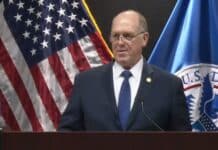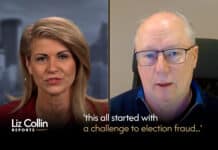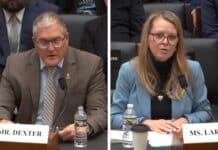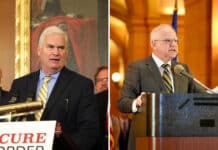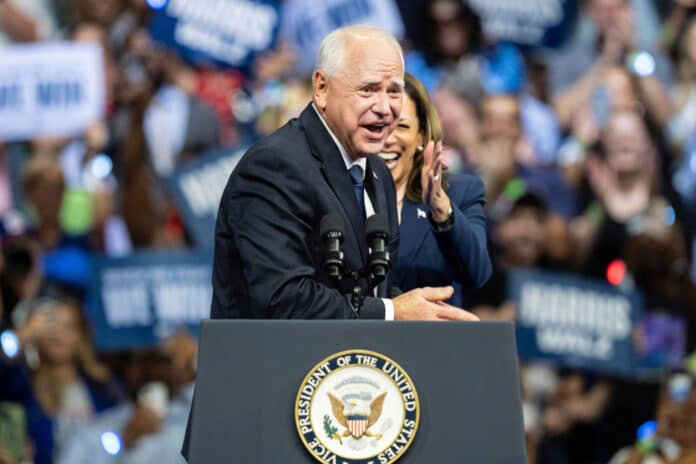
A new report from the U.S. House Judiciary Committee claims that Gov. Tim Walz’s handling of Minnesota’s $140 billion public pension fund is driving up energy bills for consumers in Minnesota and other states.
Titled “How Governor Tim Walz’s State Public Pension Fund Colludes with the Climate Cartel to Raise Energy Costs for American Consumers,” the report accuses Walz of using the Minnesota State Board of Investment (MSBI) to push overly ambitious climate goals that are being felt in consumers’ wallets.
“These funds are run by Democrat-controlled state and local governments throughout the United States and hold the retirement savings of millions of state and local public employees—including teachers, nurses, police officers, and firefighters,” the report explains.
“Blue-state public pension funds use these retirement savings as leverage to impose a ‘net zero’ climate agenda, coercing the companies in which they invest to commit to eliminate their greenhouse gas emissions by 2050.”
As governor, Walz chairs the MSBI, which passed a resolution in 2020 related to Environmental, Social, and Governance (ESG) initiatives and engages “with corporations on ESG related issues,” according to its website.
Report says MSBI waged ‘pressure campaign’
The committee’s report focuses on MSBI’s involvement with the Ceres Investor Network and Climate Action 100+, a global climate-focused investor initiative pushing companies to commit to “net-zero” emissions.
The report suggests that MSBI’s “pressure” on companies like Xcel Energy—a major energy provider for the Midwest—has forced it to phase out cheaper carbon-based energy, potentially hiking up electricity costs in the process.
“According to documents produced to the Committee, following a pressure campaign from Governor Walz’s MSBI and Climate Action 100+, Xcel Energy surrendered to the climate cartel and made a series of ‘net-zero’ climate commitments, forcing it to ‘retire’ carbon-based energy production and raise electricity prices throughout the Midwest,” the report says.
Xcel announced its carbon-free goal in December 2018 and a net-zero goal in November 2021.
“Climate Action 100+ has branded Xcel Energy as a targeted ‘focus company’ and colluded with the MSBI, as an ‘active participa[nt]’ in its engagement group, to pressure ‘Xcel Energy, Inc. on a variety of ESG issues.’ Since 2018, the climate cartel has repeatedly escalated its campaign, threatening to ‘flag’ climate-related shareholder resolutions and calling for Xcel Energy to ‘retire’ power plants early,” the report notes.
“Following its success pressuring Xcel Energy, the climate cartel believes it is ‘nearly at the tipping point needed to push the whole sector forward to rapidly decarbonize.’ As a result, it plans to broaden its pressure campaign to target even more U.S. companies with ‘large state pension funds’ including ‘Minnesota’ becoming ‘much more active as lead engagers.'”
Trump’s ‘drill, baby, drill’ stands in contrast to Walz’s green policies
The report’s findings stand in stark contrast to former President Donald Trump’s “drill, baby, drill” stance, which promotes expanding domestic oil and gas production to keep energy prices low and avoid dependency on foreign energy sources.
Where Trump’s slogan calls for tapping into U.S. oil and gas resources for economic stability, Walz’s push for carbon-free electricity prioritizes climate goals over traditional energy sources.
“Governor Walz’s embrace of the climate cartel and its collusive conduct has serious adverse consequences for American energy consumers,” the committee’s report says.
Gov. Walz signed a bill during the 2023 legislative session that will require Minnesota’s electricity grid to be 100% carbon-free by 2040, which supporters believe will eventually deliver both sustainability and savings.
In 2023, a report from the American Legislative Exchange Council showed that residents of blue states with aggressive climate policies are paying significantly more for electricity and fuel than red states.
Xcel responds
Xcel Energy, however, has its own take on the situation. In a statement to Alpha News, the company noted it was the first electric provider in the U.S. to set a carbon-free goal back in 2018, a year before Walz took office.
“We have been a longtime leader in clean energy because our customers, communities and investors expect it,” Xcel said. “Over the last several years, we’ve put that vision into action by retiring coal plants and adding significant wind and solar resources while saving customers money along the way.
“As we make this transition, maintaining system reliability and low bills for our customers are key considerations,” the company said.
Xcel added that its customers’ bills remain below the national average and emphasized it is planning “for all customers every hour of every day—including when the wind isn’t blowing and the sun isn’t shining.”
Xcel also pointed out its ongoing investments in nuclear energy, natural gas, and battery storage to ensure power is there whenever it’s needed.
“Building the energy infrastructure of the future will invest in innovative technologies, create good-paying jobs, benefit our customers economically, and support our communities,” Xcel said.
Alpha News reached out to Walz’s office for comment but did not receive a response.





